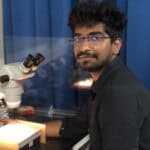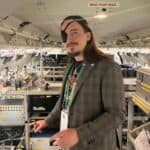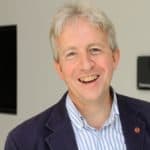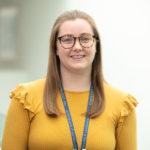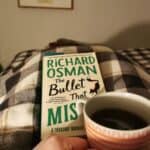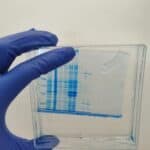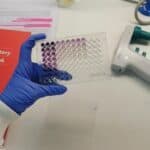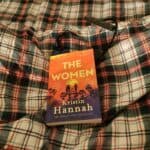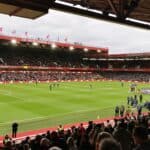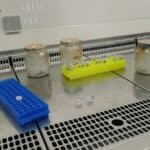Profile
Rute Santos
-
About Me:
I am Portuguese and moved to England when I was 18 years old to complete my undergraduate degree. Currently, I am an immunologist, but mostly I am obsessed with cosy books that can actually make me forget about my job.
-
Read more
I was the first person in my family to actually complete an academic degree and to go into science (and to England if I am honest)! I am now a PhD student, researching the immune response of lungs to cigarettes and vapes. One of the things I like the most is to be involved in outreach programmes, I do a lot of science communication to show people what I do and how I have gotten to be a PhD student!! I had a really tough time deciding what to study when I was younger, and I did have a great time at university tlike everyone else, it would have been nice to have some examples of people that felt like me (a bit lost and confused). So, I am really happy to be able to share my experiences with people and do my best to support students.
Other than doing science, you will always find me reading a book. I am obsessed with books, especially cosy mystery books that go well with a tea and a shortbread! I am really into my Sunday Roasts, and to be honest, food in general. I love exploring nature and find it really helps me relax after work. Realistically, I like things that make me forget about work and help me find a balance between being constantly learning and not feeling to overwhelmed about how much more I still have to learn.
-
My pronouns are:
She/Her
-
My Work:
I am a third year PhD student in immunology; in my project I try to understand what vapes and cigarettes do to lung cells, and if they change the way these cells talk to each other.
-
Read more
In the lungs, there are several types of cells that form a compact and tight barrier. Different types of lung cells can communicate with each other through the release of molecules that act as signals that can regulate lung inflammation. One of the molecules that cells release are extracellular vesicles. In my project, I expose lung cells to cigarette smoke or electronic cigarette vapour, to then compare the number and content of the extracellular vesicles released by either healthy or unhealthy (cigarette/e-cigarette exposed) lung cells to see cigarettes/vapes can influence cellular communication.
-
My Typical Day:
I wake up and have some breakfast (usually overnight oats so I don’t have to cook in the morning) and have a big cup of coffee. I walk into university, where I make some more coffee before starting my experiments. I then do some lab work (usually this involves mainly feeding cells so that these are happy and ready for experiments when needed) and then I have some lunch. Most of my afternoons are planning the next experiments, confirming I have all the reagents needed and writing about the experiments performed. When I am all done (5-6pm) I go home, have a quick snack and then I go to the gym or go for a walk with one of my friends if they are free.
-
Read more
I wake up and have some breakfast (usually overnight oats so I don’t have to cook in the morning) and have a big cup of coffee. I walk into university, and on the way to my desk I have a quick stop in the lab to switch all the machines on (usually a fume hood because I need to work in a sterile environment) and put my reagents to warm (cells are kept warm, so everything I add to my cells needs to be warm to not shock them). Then I go to the PhD student office where I make some more coffee before starting my experiments. Before starting in the lab, I go over what I planned the day before and confirm everything is good to go. I then do some lab work, which usually involves mainly feeding cells (a fancy way of saying that I change the liquid in which the cells are kept to a fresh liquid full of nutrients necessary for the cells to be alive and well), and usually once every two weeks I will make up some cigarette smoke extract or e-cigarette vape extract and give these to the cells instead of fresh nutrients. I have my lunches between experiments, so it really varies. Most of my afternoons are then planning the next experiments, confirming I have all the reagents needed and writing about the experiments performed or my project. When I am all done (5-6pm) I go home, have a quick snack and then I go to the gym or go for a walk with one of my friends or my partner when they are free.
-
What I'd do with the prize money:
I would probably reach out to schools around my university and organise a “science day” to bring some of the students to the laboratories and have a chat with some of our researchers.
-
Education:
I did the equivalent of the A-levels in Lisbon, Portugal. Things work a bit differently there, and I have to pick a field earlier (around the time I was 15 years old), and I chose “Science and Technology”. I had to do maths and Portuguese as mandatory exams, and then Biology and Physics&Chemistry. Because of the way it works when you are foreign, my exam grades were not needed for university, only my grades’ overall (B). I then came to England where I did a BSc in Biomedical Science. Biomedical Science was a very broad degree, which was quite good as it allowed me to learn a bit of different fields, and helped me choose what I wanted to specialise in. After my undergraduate I completed an MSc in Microbiology and Immunology. These degrees gave me a strong scientific background and really helped me understanding the fields I liked the most (virology and immunology). My MSc was crucial in getting a PhD, as after I got in contact with one of my lecturers and asked if I could get an internship to improve my lab skills before applying for a PhD.
-
Qualifications:
BSc (2:1) in Biomedical Science
MSc in Microbiology and Immunology (Distinction)
-
Work History:
During the second year of my undergraduate degree, I had to work part-time in a dessert restaurant where I was part of the back and front of house staff. I maintained this job throughout my BSc and MSc degrees. During my master’s I was promoted to team-leader and started working full-time.
After my MSc I emailed several of my lecturers to ask if I could get experience in their laboratories. One of my lecturers (now my PhD supervisor) replied straight away and offered me a six-month position as a research intern in an immunology laboratory. Alongside my full-time job in the restaurant, I worked alongside 5 PhD students, where I was involved in a wide range of projects investigating the early stages of disease development. My internship was extended for another six months, and subsequently I was offered a research assistant position studying the immune responses caused by SARS-COV-2 virus, prior and post-vaccination.
After this year of research, I started applying for PhD positions, but this took longer than I anticipated (over a year and a half), so I had to keep my job in hospitality. For that year and a half I was a team leader in a different restaurant, where I was responsible for a team of 5/6 people and had to supervise the preparation and ensure that the customers were happy
-
Current Job:
I am currently starting the third year of my PhD, as part of the Biotechnology and Biological Sciences Doctoral Training Programme (BBSRC). This is a 4-year programme that supports innovative PhD training in biological sciences. My research studies the impact of conventional smoke and electronic cigarette vape on human lung-epithelial intercellular communication, and how these can interact and influence lung immune responses.
-
Employer:
UKRI: BBSRC DTP
-
My Interview
-
How would you describe yourself in 3 words?
Reading a book
What did you want to be after you left school?
When? When I was young, I wanted to be a singer, then a doctor, then I wanted to be in economy. I had too many ideas!
Were you ever in trouble at school?
Yes, I was in trouble once or twice
If you weren't doing this job, what would you choose instead?
I would be in politics
Who is your favourite singer or band?
I would have to say Bad Bunny
What's your favourite food?
Dark chocolate any time
If you had 3 wishes for yourself what would they be? - be honest!
1. Being healthy without having to eat properly or exercise 2. Owning a book shop with a little caffe 3. Not needing to consider the money aspect of my future career
Tell us a joke.
Why didn't the skeleton go to the party? A: Because he had no-body to go with!
-

